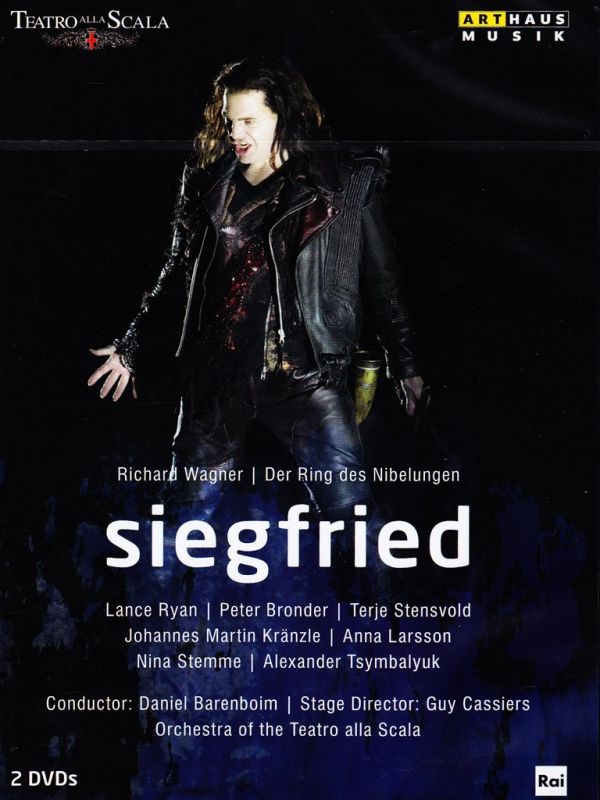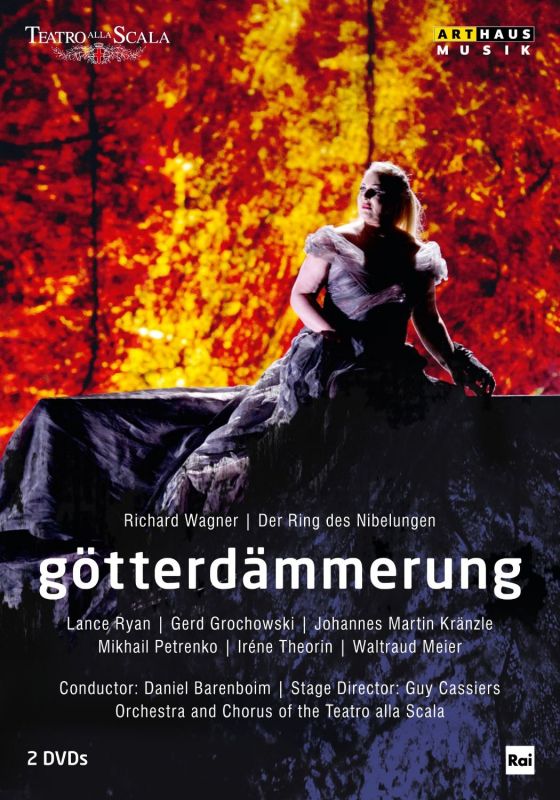WAGNER Siegfried. Götterdämmerung
View record and artist detailsRecord and Artist Details
Composer or Director: Richard Wagner
Genre:
Opera
Label: Arthaus Musik
Magazine Review Date: 06/2014
Media Format: Digital Versatile Disc
Media Runtime: 253
Mastering:
DDD
Catalogue Number: 101 695

Tracks:
| Composition | Artist Credit |
|---|---|
| (Der) Ring des Nibelungen: Part 3, 'Siegfried' |
Richard Wagner, Composer
Alexander Tsymbalyuk, Fafner, Bass Anna Larsson, Erda, Contralto (Female alto) Daniel Barenboim, Conductor Johannes Martin Kränzle, Alberich, Baritone Lance Ryan, Siegfried, Tenor Milan La Scala Orchestra Nina Stemme, Brünnhilde, Soprano Peter Bronder, Mime, Tenor Richard Wagner, Composer Rinnat Moriah, Woodbird, Soprano Terje Stensvold, Wanderer, Baritone |
Composer or Director: Richard Wagner
Genre:
Opera
Label: Arthaus Musik
Magazine Review Date: 06/2014
Media Format: Digital Versatile Disc
Media Runtime: 292
Mastering:
DDD
Catalogue Number: 101 696

Tracks:
| Composition | Artist Credit |
|---|---|
| (Der) Ring des Nibelungen: Part 4, 'Götterdämmerung' |
Richard Wagner, Composer
Aga Mikolaj, Woglinde, Soprano Anna Lapkovskaja, Flosshilde, Mezzo soprano Anna Samuil, Third Norn, Soprano Anna Samuil, Gutrune, Soprano Daniel Barenboim, Conductor Gerd Grochowski, Gunther, Baritone Iréne Theorin, Brünnhilde, Soprano Johannes Martin Kränzle, Alberich, Baritone Lance Ryan, Siegfried, Tenor Margarita Nekrasova, First Norn, Mezzo soprano Maria Gortsevskaya, Wellgunde, Mezzo soprano Mikhail Petrenko, Hagen, Bass Milan La Scala Chorus Milan La Scala Orchestra Richard Wagner, Composer Waltraud Meier, Second Norn, Mezzo soprano Waltraud Meier, Waltraute, Mezzo soprano |
Author: Arnold Whittall
Barenboim’s flair for drawing out often under-characterised details, as with the string-writing in the Götterdämmerung funeral music, is one outstanding feature. Even more important is his melding of space and time to ensure that the full eloquence of the musical drama can be conveyed without exaggeration or treading water. I don’t think I’ve ever heard less episodic accounts of the immense structures of Siegfried’s third act or the first act of Götterdämmerung. So, even when reservations about singing, staging and filming are all factored in, this is an absorbing portrait of a fine Wagner conductor at the height of his powers.
Cassiers’s production is rather artful in combining quite traditional demands on the singers with a setting that employs simple structures – representing Mime’s forge, Brünnhilde’s rock, the Gibichung’s hall, and so on – against a high-tech background of projections that mix abstract and naturalistic images for reasons which the booklet-notes attempt to explain. Viewed on a small screen, there’s an element of neither one thing nor the other about this but, given the musical virtues, the setting contributes enough atmosphere to the staging to be acceptable in its own terms. The film technique of frequently fading out singers to show some of the set before fading them in again takes some getting used to but can’t be rated a serious drawback, irritating though it is in places.
As for the singers: there’s the considerable plus of a pair of Brünnhildes, Nina Stemme and Iréne Theorin, whose sumptuous voices serve both the human and mythic aspects of the drama to admirable effect. Anna Larsson as Erda and Waltraud Meier as Waltraute are no less memorable in their smaller roles. Much of the focus is on Lance Ryan’s Siegfried, aggressively saturnine rather than naively jovial, and even more prone to project harshly in the second opera than the first: in this context, the more intimate declamatory style he finds for Siegfried’s final narration is gratifying and shows that he can call on something more than mere stamina in delivering these punishingly demanding roles. No disappointments with the other male singers – just a pity that the producer has Hagen address the audience rather than the vassals assembled behind him in Götterdämmerung Act 2. This underlines that while Cassiers achieves an uneasy compromise between tradition and innovation, Barenboim provides a masterclass in Wagner interpretation that need fear no comparison with the greatest of his precursors.
Discover the world's largest classical music catalogue with Presto Music.

Gramophone Digital Club
- Digital Edition
- Digital Archive
- Reviews Database
- Full website access
From £8.75 / month
Subscribe
Gramophone Full Club
- Print Edition
- Digital Edition
- Digital Archive
- Reviews Database
- Full website access
From £11.00 / month
Subscribe
If you are a library, university or other organisation that would be interested in an institutional subscription to Gramophone please click here for further information.




